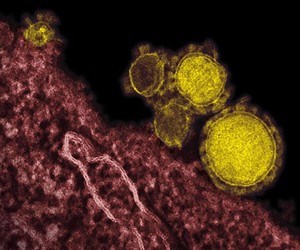
An undated electron microscope image made availalbe by the National Institute of Allergy and Infections Diseases shows novel coronavirus particles, also known as the MERS virus, colorized in yellow. THE CANADIAN PRESS/AP, NIAID - RML
December 16, 2013 - 3:32 PM
A new scientific paper confirms that camels on a farm in Qatar were sick with MERS earlier this fall.
But the report does not make clear whether camels infected people on the farm in question, whether people infected camels or whether an unidentified third species infected both.
In fact, the senior author of the study says the evidence as it exists cannot determine which way the virus spread.
And virologist Marion Koopmans, of the Dutch National Institute of Public Health, says it is unlikely that the mystery will be cleared up in this case.
But she and others say the work is important confirmation that camels can be infected with the coronavirus that causes MERS.
Previous studies have shown camels from several Middle Eastern and North African countries have antibodies to MERS or a MERS-like virus, but Koopmans says this work makes it clear dromedaries and people are being infected with the same virus.
"It is confirmation that camels can be infected. But it's certainly not providing all the answers," admits Koopmans, who also has an appointment at Erasmus Medical Center in Rotterdam.
Genetic sequences of the viral RNA recovered in the testing showed the camel viruses were very close to the human viruses, with some small differences.
The work was a collaboration between scientists in the Netherlands and public health officials in Qatar, who made a preliminary announcement of the findings in late November.
Qatar launched an in-depth investigation — which is still ongoing — after two men who lived on a farm contracted MERS in October.
The early testing uncovered the fact that at least three of 14 camels on the farm were infected with MERS. Additional lab work revealed that another three probably were also infected when they were tested. And all of the animals had antibodies to the virus, suggesting they had all been infected at some point.
But Koopmans says the animals do not seem to shed a lot of virus, lowering the chances of getting positive results. And the animals appear to have few or no symptoms during infection, which adds to the difficulty of determining whether camels infected humans or the reverse.
Dr. Anthony Mounts, the World Health Organization's lead scientist on the MERS file, agrees this study cannot reveal whether camels are playing a major role in the spread of MERS, which has infected at least 165 people since April of 2012, killing 71 of those people.
"I just don't think we're quite at the point yet where we can blame everything on camels and be sure that they are the reservoir that's forming the source of virus for human infections," Mounts said in an interview from Cairo, where he was attending a meeting called to plan future studies on MERS.
At the meeting, all MERS-affected countries agreed to take part in a multinational case control study, a type of investigation where people who contract the virus are compared to similar people who do not in an attempt to find out how people are becoming infected.
The WHO and the scientific community have been calling for case control studies for some time. Mounts says Qatar's strong work on the farm investigation has spurred interest in more collaborative research among affected countries.
On the issue of the camel study — which was published in the journal Lancet Infectious Diseases — Mounts says he still thinks there is a strong possibility that another animal species may be involved in the spread of MERS.
"I think that's still a very active area of investigation that needs to be carried through," he says.
"To me, sheep are still in the lineup of suspects. I think we can't write them off yet."
There were sheep on the Qatari farm where human and camel cases occurred. Koopmans says testing is still underway on samples from sheep and other animals on the farm.
A study published last week in the journal Eurosurveillance reported blood from six sheep in Jordan reacted in testing for MERS antibodies, but no neutralizing antibodies — the type that kill a pathogen — were found.
A commentary published with the study says finding how the virus is transmitting to people could provide clues to how to stop the outbreak, if the main mode of spread is still animal to human.
And Neil Ferguson and Maria Van Kerkhove of the Medical Research Council Centre for Outbreak Analysis and Modelling at Imperial College London say Qatar's handling of the outbreak should serve as a model for investigation of future cases.
News from © The Canadian Press, 2013